Inside Tori's Notebook is a weekly series where Tori re-opens her game notebook to look back at her notes, questions and observations from the Falcons most recent game. Tori breaks down her thoughts and gives her analysis on what happened, and why it's notable. Inside Tori's Notebook is sponsored by Microsoft Surface.
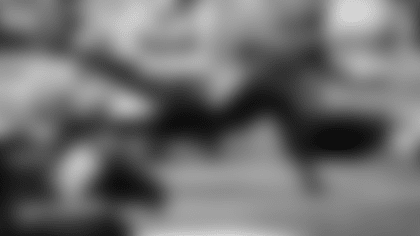
IN A FRUSTRATED STATE -- I can still feel my right eye twitching a little bit after the Falcons 20-17 loss to the Chargers on Sunday. Yes, it's Monday morning, and yes, I did just down a very large coffee, but still. The twitch could be caffeine-related but I think Sunday's game plays into the twitch, too.
The Falcons played very well in spurts on Sunday. But those spurts were not sustained through four quarters, which allowed the Chargers to hang around and win on a last-second field goal.
RELATED CONTENT:
There are - I'm sure - moments this team wants back. You can't look at this game in review and not feel that way if you're the Falcons. However, they can't sit in that feeling for too long because they have a quick turnaround as they face Carolina again on Thursday.
Before we officially turn the page, though, let's take one final look back at a frustrating loss to the Chargers. And yes, I do use the word "frustrating" a lot in this notebook recap.
Major whiplash
I'm going to be honest: I don't think I've ever felt such a serious case of emotional whiplash as I did from the first quarter to the second quarter on Sunday.
In the three years I've been covering this team, I've felt whiplash from half to half. I felt like a theme of the 2020 team was almost a tale of two halves story. But very rarely have I felt such a swift 180 degree turn from one singular quarter to the next the way I felt it on Sunday.
And here, I'll just let the stats speak for themselves...
In the first quarter, the Falcons accumulated 145 total yards of offense (92 of said yards being rushing yards). They scored 10 points and held onto possession for almost 13 minutes.
In comparison, the Chargers were held to 16 total yards, no points and a little over two minutes of possession.
By the of second quarter, those stats were flipped on their head, and my head (like yours I'm sure) was feeling the whiplash.
In the second quarter, the Falcons had -5 yards of offense. They scored no points.
In comparison, the Chargers bounced back to have 166 total yards of offense and 14 points before halftime.
It was astounding, how quickly this shift happened.
What's most frustrating in this was that the Falcons finally found the start they needed. I feel like I've been saying for weeks now that the Falcons need to start games quicker. They did that, and I think I can say with confidence that this first quarter start for both the offense and defense was the most productive start for Atlanta this season.
Frustration enters when it becomes a start that is not sustained. And it wasn't. The stat line above proves it.

How many third downs have the Falcons defense given up?
What's crazy to me is how early I made note of this question in my notebook. It was about a quarter of the way through the second quarter after the Chargers first touchdown drive. In said drive, they converted four - yes, four - third downs. Of those four, only one was a third-and-short situation.
There were a lot of frustrating flash points throughout Sunday's game but none that grated on me quite like this drive.
Getting off the field on third down has been an issue for this defense in recent weeks. I wrote about it last week when the Falcons took Carolina to overtime, and I'm writing it again this week.
The difference, though, is also in something I wrote about postgame, which is that when you look at the entire course of the game the Falcons were actually getting the Chargers offense off the field at a productive pace. It was the timeliness of the Chargers third down conversions that mattered.
As we've already said, the Chargers converted all of their third downs in that first scoring drive. They would go on to convert two more later in that quarter before halftime. Fast forward to the fourth quarter and Los Angeles converted two of their five third downs, which seems like a good thing for the Falcons defense, right? Well, not necessarily.
As I noted postgame, what happened after those three third down situations was actually very productive for the Chargers. The first one saw Los Angeles go for it on fourth down and convert. The second one saw them bring out the kicking team for a 31-yard field goal. And the third? It was the fumble recovered by Ta'Quon Graham that turned into another fumble that the Chargers recovered.
Mykal Walker said after the game that the defense does not have a problem getting opposing offenses in third down situations. And they really don't. They have a hard time winning the third down situations that matter most in the flow of a game.

Shrouded
The story of the game - if the Falcons would have won - was very obvious. It had everything to do with not only Cordarrelle Patterson's return to the field, but also Tyler Allgeier's 99-rushing-yard performance and Caleb Huntley bulldozing his way to an almost five yards a carry average.
However, the loss trumped the performance of this three-headed monster in the Falcons backfield.
What's flabbergasting in all of this is that the Falcons finished Sunday's game with 201 rushing yards. As a team, they averaged 5.7 yards a carry. Patterson scored two rushing touchdowns.
And I'll say it: If you run the ball like this? For over 200 yards in a game? At a clip of over five yards a run on average? You should win the game. You should. At any level. That type of production should never be something that goes overlooked or overshadowed. And yet...
It was on Sunday.
"Why did the Falcons get away from the run in the second half?"
I can't count how many times I was asked this question once the game ended. So. Many. Times.
Now that we're 24 hours beyond the game's start, I have an answer for you. And guess what? You're probably not going to like it. Why? Because the Falcons didn't go away from the run. They didn't go away from it at all.
Of the 30 plays the Falcons ran in the second half, 20 were designed runs. More so, those 20 runs accumulated just over 100 rushing yards to get the Falcons to their 201 total rushing yards on the day.
So, I hate to break it to you, but the Falcons running the ball was not the problem in the second half. And no, they did not go away from it. The actual problem here is two fold: 1) The Falcons only had three total offensive plays in the fourth quarter, and 2) When they did throw the ball in the second half, they were productive doing so only 50 percent of the time.
Atlanta threw the ball 10 times in the second half. Five of those 10 targets came up incomplete. And though Falcons receivers did have 71 receiving yards in the third and fourth quarter, one of those five catches ended with the Drake London strip fumble.
I've written this before and I'll write it again: The problem of the 2022 Falcons offense is not in the volume of which they are throwing the ball, but the execution when they do.
And I know what you're thinking: Tori, if that's the case why did they throw the ball twice in their final drive in the fourth quarter? Why not run it three times in a row? I actually asked Marcus Mariota that same question, particularly what happened on that second down incompletion to Kyle Pitts.
Here's his answer:
"Actually, I thought our coaches did a great job of creating an adjustment on the sideline," Mariota said. "We were getting some loaded boxes, but they were playing some shell defenses, some two-high safeties. We thought Kyle might have a chance to run through there. Initially the ball was supposed to go to CP. They kind of all collapsed on him and Kyle just made a great play and got through there. I've just got to give him a chance, give him a better ball."
So, why did the Falcons "get away from the run"? Because they saw an opportunity with a loaded box, on second and eight, to make a big play through the air and they didn't execute it. Then, you have third and eight and because of field position on your own 27 yard line and with significant time on the clock, you are not necessarily in two-down territory.
You hope you convert on third and long (in an obvious passing down situation), but if you don't you rely on your defense to make a play or a stop to give the ball back to your offense. (And really, they were one fumble away from actually doing so).
I want to be clear, too, that I'm not giving the Falcons a pass here, either.
They should have executed better in the fourth quarter. I am in no way, shape or form excusing that. However, I did want to break down the thought process in doing what they did the way I saw it. And why "getting away from the run" is not how I would describe the Falcons second half game plan.
There was logic there, but sometimes I know people don't want to hear logic in a loss like that, especially if there is no execution that ultimately could have led to a win.
We take a monochrome look at the game against the Los Angeles Chargers on November 6, 2022.

Atlanta Falcons running back Cordarrelle Patterson #84 warms up prior to the game against the Los Angeles Chargers at Mercedes-Benz Stadium in Atlanta, Georgia on Sunday, November 6, 2022. (Photo by Brandon Magnus/Atlanta Falcons)

Falcon statue outside the stadium before the game against the Los Angeles Chargers at Mercedes-Benz Stadium in Atlanta, GA on Sunday, November 6, 2022. (Photo by Chamberlain Smith/Atlanta Falcons)

General view of soldiers during halftime against the Los Angeles Chargers at Mercedes-Benz Stadium in Atlanta, Georgia on Sunday, November 6, 2022. (Photo by Shanna Lockwood/Atlanta Falcons)

Scene setters before the game against the Los Angeles Chargers at Mercedes-Benz Stadium in Atlanta, Georgia on Sunday, November 6, 2022. (Photo by Brandon Magnus/Atlanta Falcons)
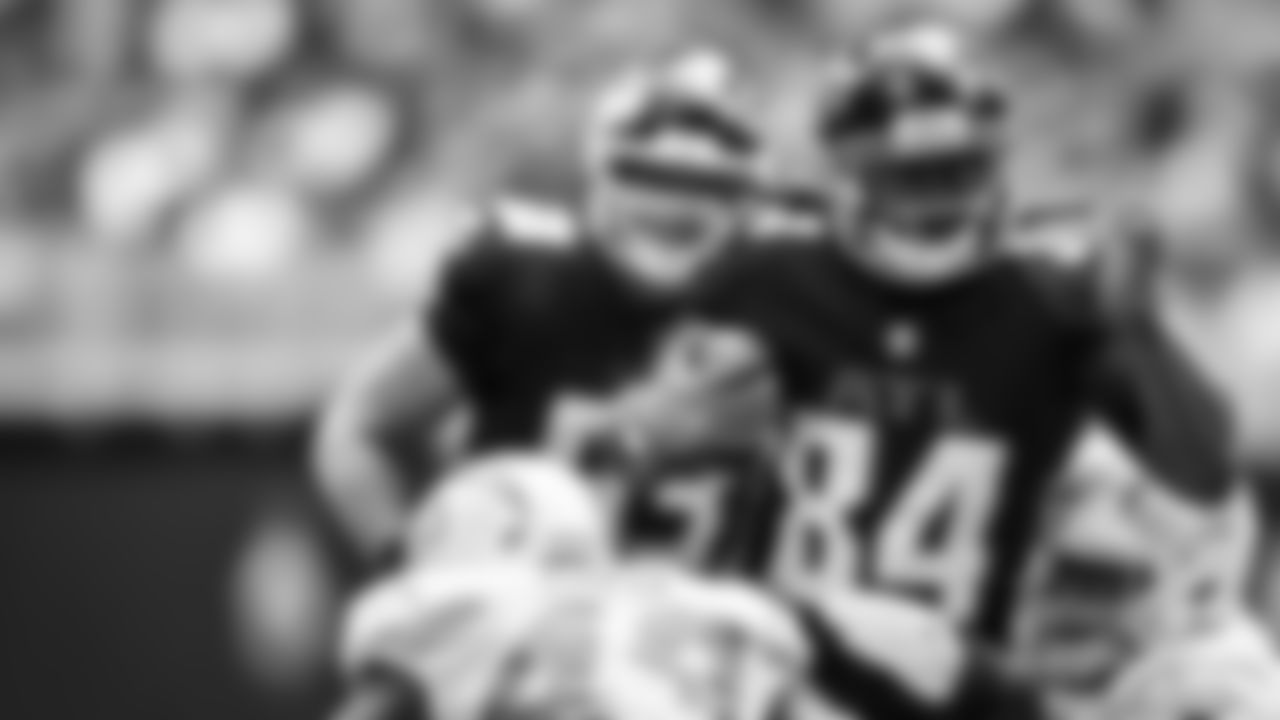
Atlanta Falcons running back Cordarrelle Patterson #84 rushes during the first half against the Los Angeles Chargers at Mercedes-Benz Stadium in Atlanta, Georgia on Sunday, November 6, 2022. (Photo by Brandon Magnus/Atlanta Falcons)

Atlanta Falcons inside linebacker Rashaan Evans #54 and inside linebacker Mykal Walker #3 make a tackle during the first half against the Los Angeles Chargers at Mercedes-Benz Stadium in Atlanta, Georgia on Sunday, November 6, 2022. (Photo by Brandon Magnus/Atlanta Falcons)

Fans react during the game against the Los Angeles Chargers at Mercedes-Benz Stadium in Atlanta, Georgia on Sunday, November 6, 2022. (Photo by Chamberlain Smith/Atlanta Falcons)

Atlanta Falcons defensive lineman Grady Jarrett #97 prior to the game against the Los Angeles Chargers at Mercedes-Benz Stadium in Atlanta, Georgia on Sunday, November 6, 2022. (Photo by Brandon Magnus/Atlanta Falcons)

Atlanta Falcons long snapper Liam McCullough #48 warms up prior to a game against the Los Angeles Chargers at Mercedes-Benz Stadium in Atlanta, Georgia on Sunday, November 6, 2022. (Photo by Brandon Magnus/Atlanta Falcons)

The Devotion cast pulls the train horn before the game against the Los Angeles Chargers at Mercedes-Benz Stadium in Atlanta, Georgia on Sunday, November 6, 2022. (Photo by Chamberlain Smith/Atlanta Falcons)
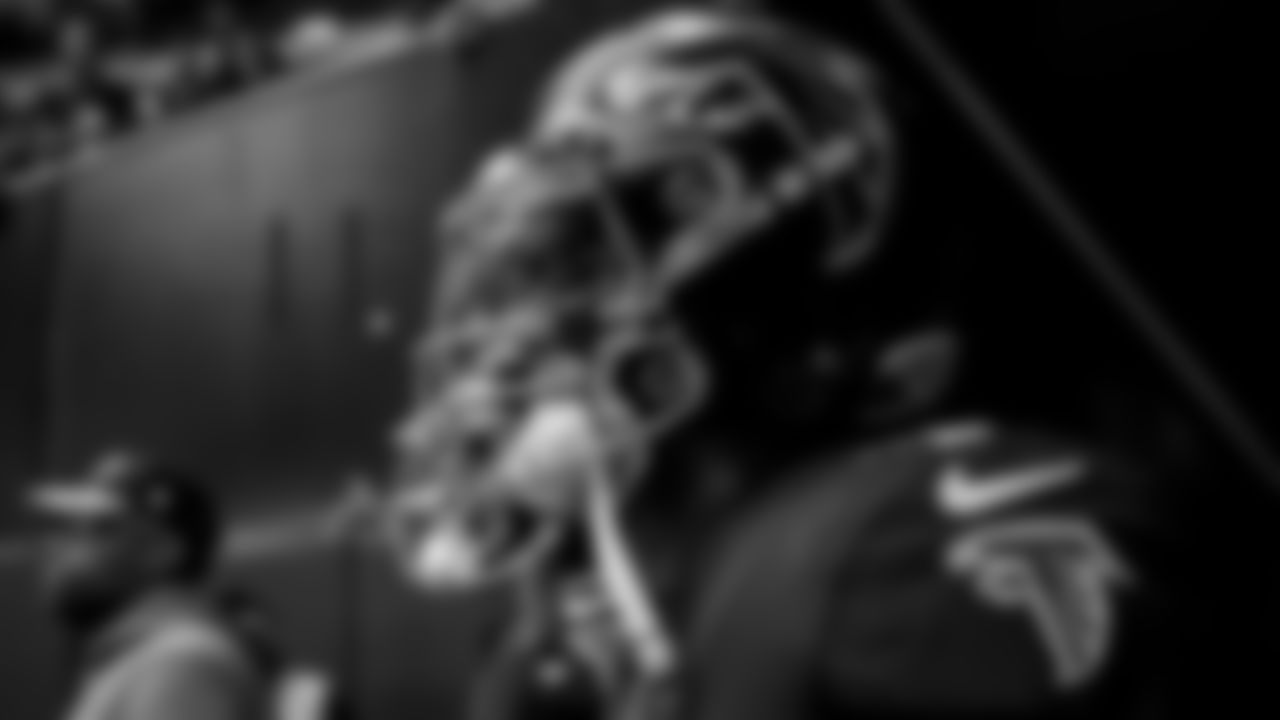
Atlanta Falcons quarterback Marcus Mariota #1 walks out prior to the game against the Los Angeles Chargers at Mercedes-Benz Stadium in Atlanta, Georgia on Sunday, November 6, 2022. (Photo by Brandon Magnus/Atlanta Falcons)

Atlanta Falcons general manager Terry Fontenot is seen on the field prior to the game against the Los Angeles Chargers at Mercedes-Benz Stadium in Atlanta, Georgia on Sunday, November 6, 2022. (Photo by Brandon Magnus/Atlanta Falcons)

Atlanta Falcons and Los Angeles Chargers players pray together after their game at Mercedes-Benz Stadium in Atlanta, Georgia on Sunday, November 6, 2022. (Photo by Brandon Magnus/Atlanta Falcons)

Atlanta Falcons players walk out prior to the game against the Los Angeles Chargers at Mercedes-Benz Stadium in Atlanta, Georgia on Sunday, November 6, 2022. (Photo by Brandon Magnus/Atlanta Falcons)
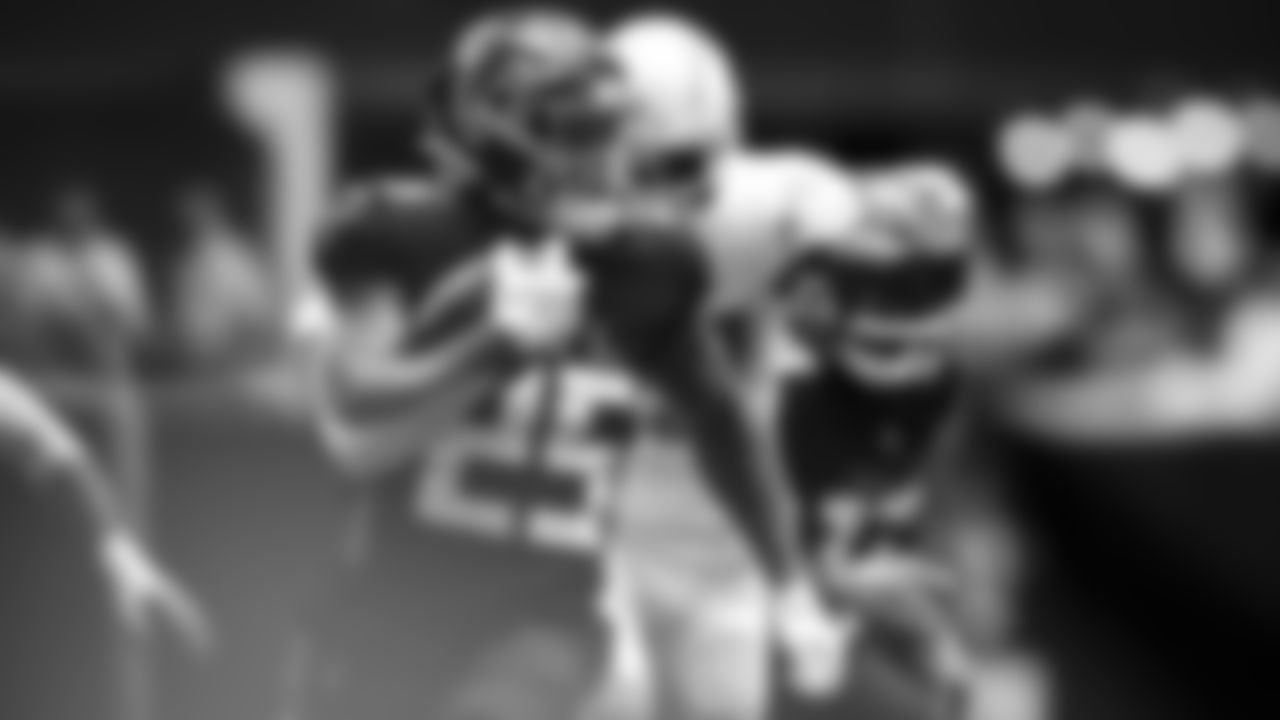
Atlanta Falcons running back Tyler Allgeier #25 rushes during the first quarter against the Los Angeles Chargers at Mercedes-Benz Stadium in Atlanta, Georgia on Sunday, November 6, 2022. (Photo by Brandon Magnus/Atlanta Falcons)
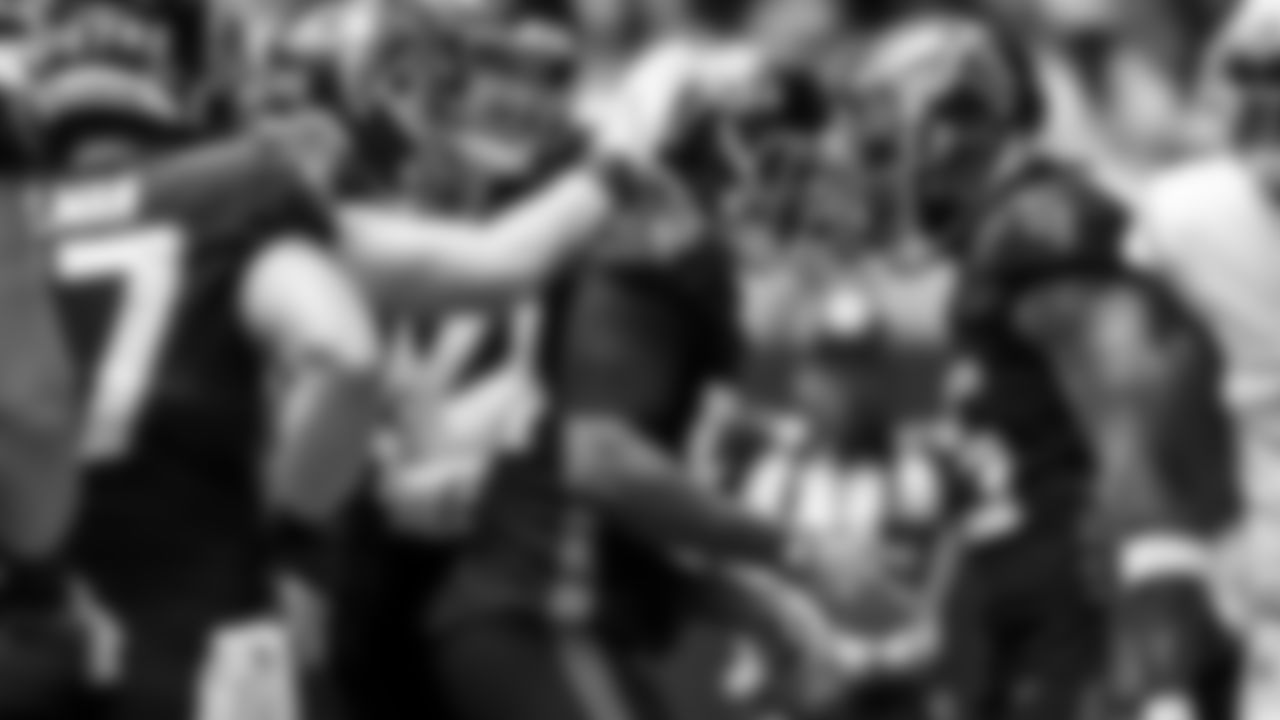
Atlanta Falcons running back Cordarrelle Patterson #84 celebrates after scoring a touchdown during the first quarter against the Los Angeles Chargers at Mercedes-Benz Stadium in Atlanta, Georgia on Sunday, November 6, 2022. (Photo by Brandon Magnus/Atlanta Falcons)

Scenes from the Dirty Birds March before the game against the Los Angeles Chargers at Mercedes-Benz Stadium in Atlanta, Georgia on Sunday, November 6, 2022. (Photo by Chamberlain Smith/Atlanta Falcons)

Fans cheer during the game against the Los Angeles Chargers at Mercedes-Benz Stadium in Atlanta, Georgia on Sunday, November 6, 2022. (Photo by Chamberlain Smith/Atlanta Falcons)
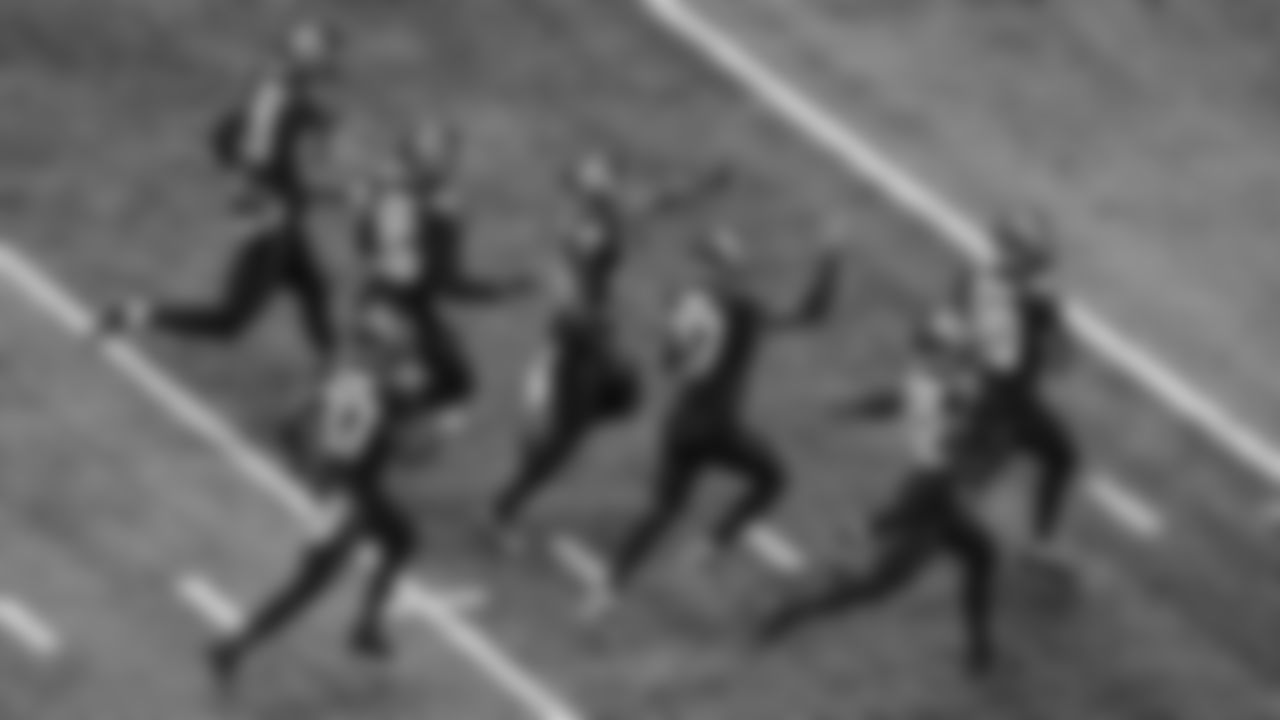
Atlanta Falcons defense celebrates after an interception during the game against the Los Angeles Chargers at Mercedes-Benz Stadium in Atlanta, Georgia on Sunday, November 6, 2022. (Photo by Chamberlain Smith/Atlanta Falcons)

The National Anthem Singer sings before the game against the Los Angeles Chargers at Mercedes-Benz Stadium in Atlanta, Georgia on Sunday, November 6, 2022. (Photo by Karl Moore/Atlanta Falcons)

Atlanta Falcons kicker Younghoe Koo #7 warms up prior to a game against the Los Angeles Chargers at Mercedes-Benz Stadium in Atlanta, Georgia on Sunday, November 6, 2022. (Photo by Mitchell Martin/Atlanta Falcons)

Atlanta Falcons fullback Keith Smith #40 arrives prior to a game against the Los Angeles Chargers at Mercedes-Benz Stadium in Atlanta, Georgia on Sunday, November 6, 2022. (Photo by Mitchell Martin/Atlanta Falcons)

Atlanta Falcons cornerback Mike Ford #28 reacts after a play during the first half against the Los Angeles Chargers at Mercedes-Benz Stadium in Atlanta, Georgia on Sunday, November 6, 2022. (Photo by Mitchell Martin/Atlanta Falcons)

Atlanta Falcons tight end Feleipe Franks #15 and wide receiver KhaDarel Hodge #12 prior to the game against the Los Angeles Chargers at Mercedes-Benz Stadium in Atlanta, Georgia on Sunday, November 6, 2022. (Photo by Mitchell Martin/Atlanta Falcons)

Atlanta Falcons outside linebacker Arnold Ebiketie #47 arrives prior to a game against the Los Angeles Chargers at Mercedes-Benz Stadium in Atlanta, Georgia on Sunday, November 6, 2022. (Photo by Mitchell Martin/Atlanta Falcons)

Atlanta Falcons wide receiver Drake London #5 arrives prior to a game against the Los Angeles Chargers at Mercedes-Benz Stadium in Atlanta, Georgia on Sunday, November 6, 2022. (Photo by Shanna Lockwood/Atlanta Falcons)

Atlanta Falcons tight end MyCole Pruitt #85 is tackled during the first half against the Los Angeles Chargers at Mercedes-Benz Stadium in Atlanta, Georgia on Sunday, November 6, 2022. (Photo by Shanna Lockwood/Atlanta Falcons)

Atlanta Falcons running back Cordarrelle Patterson #84 rushes for a touchdown during the second half against the Los Angeles Chargers at Mercedes-Benz Stadium in Atlanta, Georgia on Sunday, November 6, 2022. (Photo by Mitchell Martin/Atlanta Falcons)

Actor Jonathan Majors from the film Devotion on the field prior to the game against the Los Angeles Chargers at Mercedes-Benz Stadium in Atlanta, Georgia on Sunday, November 6, 2022. (Photo by Shanna Lockwood/Atlanta Falcons)

Atlanta Falcons running back Tyler Allgeier #25 rushes during the second half against the Los Angeles Chargers at Mercedes-Benz Stadium in Atlanta, Georgia on Sunday, November 6, 2022. (Photo by Mitchell Martin/Atlanta Falcons)

Atlanta Falcons running back Cordarrelle Patterson #84 celebrates after scoring a touchdown during the first quarter against the Los Angeles Chargers at Mercedes-Benz Stadium in Atlanta, Georgia on Sunday, November 6, 2022. (Photo by Mitchell Martin/Atlanta Falcons)

Atlanta Falcons kicker Younghoe Koo #7 warms up prior to a game against the Los Angeles Chargers at Mercedes-Benz Stadium in Atlanta, Georgia on Sunday, November 6, 2022. (Photo by Shanna Lockwood/Atlanta Falcons)

Atlanta Falcons defensive lineman Grady Jarrett #97 arrives prior to a game against the Los Angeles Chargers at Mercedes-Benz Stadium in Atlanta, Georgia on Sunday, November 6, 2022. (Photo by Shanna Lockwood/Atlanta Falcons)

Atlanta Falcons fullback Keith Smith #40 reacts after a play during the first half against the Los Angeles Chargers at Mercedes-Benz Stadium in Atlanta, Georgia on Sunday, November 6, 2022. (Photo by Shanna Lockwood/Atlanta Falcons)

Atlanta Falcons long snapper Liam McCullough #48 warms up prior to a game against the Los Angeles Chargers at Mercedes-Benz Stadium in Atlanta, Georgia on Sunday, November 6, 2022. (Photo by Shanna Lockwood/Atlanta Falcons)

General view of soldiers during halftime against the Los Angeles Chargers at Mercedes-Benz Stadium in Atlanta, Georgia on Sunday, November 6, 2022. (Photo by Shanna Lockwood/Atlanta Falcons)
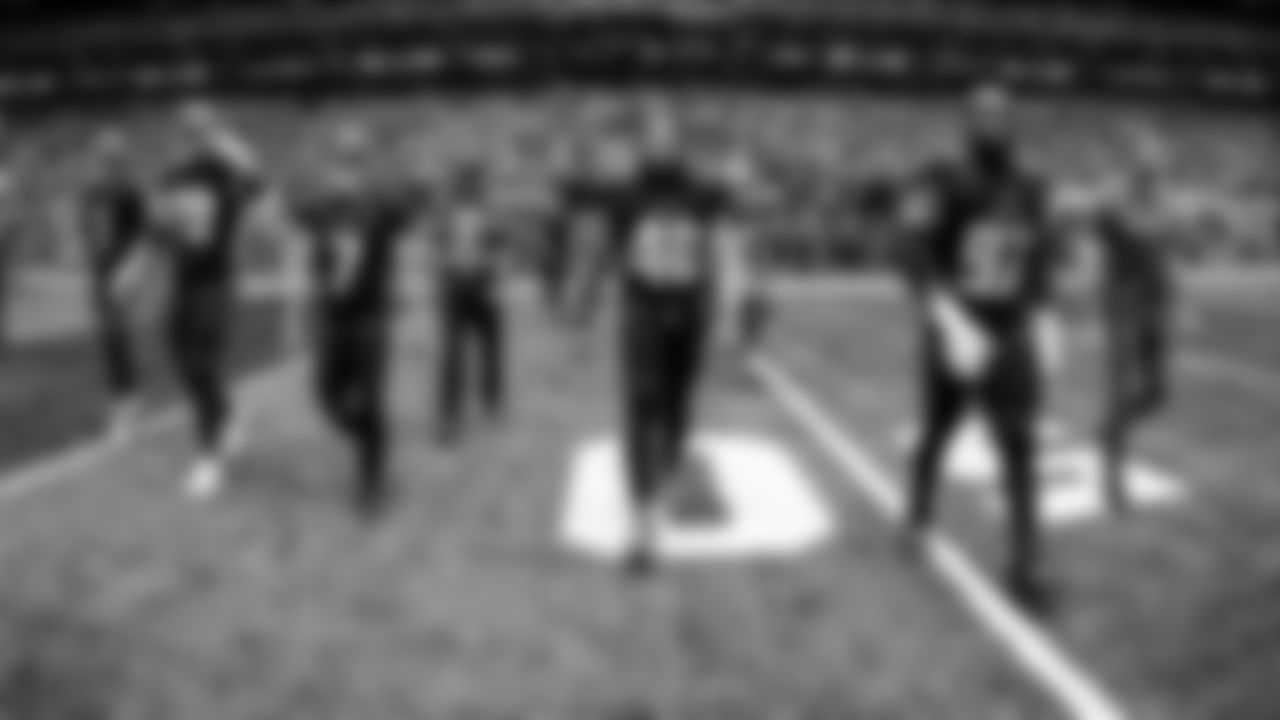
Captains walk to midfield for the coin toss prior to the game against the Los Angeles Chargers at Mercedes-Benz Stadium in Atlanta, Georgia on Sunday, November 6, 2022. (Photo by Shanna Lockwood/Atlanta Falcons)

Atlanta Falcons offensive lineman Drew Dalman #67 is seen on the sideline during the game against the Los Angeles Chargers at Mercedes-Benz Stadium in Atlanta, Georgia on Sunday, November 6, 2022. (Photo by Shanna Lockwood/Atlanta Falcons)

Atlanta Falcons head coach Arthur Smith is seen on the sideline during the second half against the Los Angeles Chargers at Mercedes-Benz Stadium in Atlanta, Georgia on Sunday, November 6, 2022. (Photo by Shanna Lockwood/Atlanta Falcons)
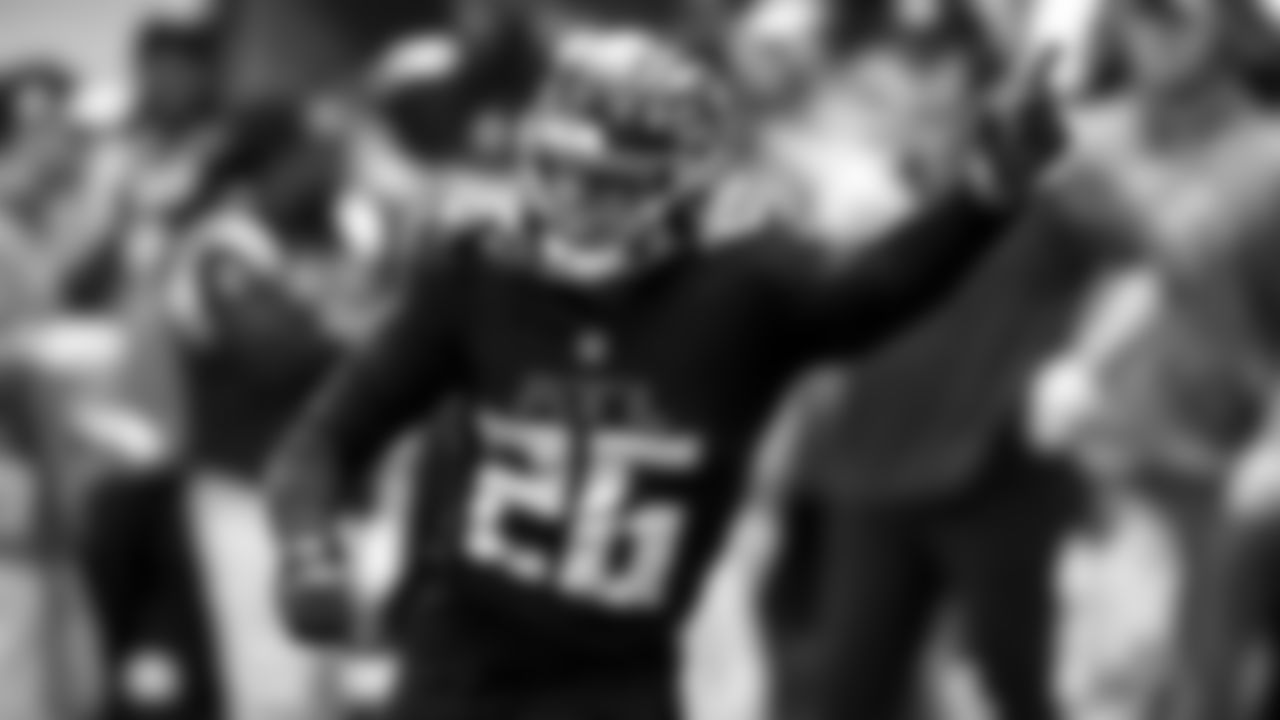
Atlanta Falcons cornerback Isaiah Oliver #26 celebrates after an interception by safety Richie Grant #27 during the second half against the Los Angeles Chargers at Mercedes-Benz Stadium in Atlanta, Georgia on Sunday, November 6, 2022. (Photo by Shanna Lockwood/Atlanta Falcons)

Atlanta Falcons safety Richie Grant #27 walks out prior to the game against the Los Angeles Chargers at Mercedes-Benz Stadium in Atlanta, Georgia on Sunday, November 6, 2022. (Photo by Shanna Lockwood/Atlanta Falcons)

Swaggin' Since 1966
Takin' it back to 1966! Shop the Red Helmet Collection today online or in-store at Atlantic Station.














